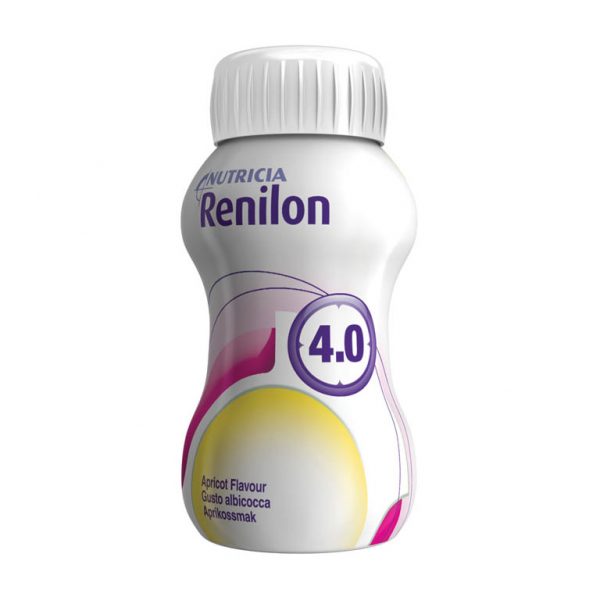
Product Information
A ready-to-drink, high energy, low protein, reduced mineral oral nutritional supplement for the dietary management of patients with renal disease (pre-dialysis).
Link copied!
Indications
For the dietary management of:
- Disease-related malnutrition.
- Patients with renal disease receiving conservative treatment (pre-dialysis).
- Patients requiring a fluid or volume restriction.
- Patients requiring a select mineral restriction.
Important Notice
- Not suitable as a sole source of nutrition.
- Not suitable for parenteral use.
- Not suitable for patients with galactosaemia.
- Not suitable for patients with cow’s milk protein allergy.
- Not suitable for infants and children under 3 years of age.
- Must be used under medical supervision.
Directions of Use
- Shake well before use.
- Best served chilled.
- Usage to be determined by a healthcare professional.
Storage
- Store in a cool, dry place.
- Once opened, close the bottle and store in the refrigerator.
- Discard unused contents after 24 hours.
Order Information
To order contact Nutricia Customer Experience 1800 889 480
| Renilon 4.0 | Presentation | Code | Units per carton |
| Apricot | 125ml bottle | 70977 | 24 |
Ingredients
Full ingredients list and nutritional information is available on the product fact sheet.
Allergen & Cultural Information
- Contains: milk and soy.
- Halal certified.
- No gluten containing ingredients. No detectable gluten when tested to a sensitivity level of less than 5 parts per million (<5 ppm i.e. <5mg/kg).
- Low lactose (lactose <2g/100g).
References
- Toigo G, Aparicio M, Attman PO et al. Consensus Report. Expert working group report on nutrition in adult patients with renal insufficiency (part 1 of 2). Clin Nutr 2000; 19: 197-207.
- Toigo G, Aparicio M, Attman PO et al. Consensus Report. Expert working group report on nutrition in adult patients with renal insufficiency (part 2 of 2). Clin Nutr 2000; 19: 281-291.
- Chugh SN, Jain S, Agrawal N, Sharma A. Evaluation of oxidative stress before and after haemodialysis in chronic renal failure. J Assoc Physicians India 2000; 48: 981-84.
- Ceballos-Picot I, Witko-Sarsat V, Merad-Boudia M, Nguyen AT et al. Glutathione antioxidant system as a marker of oxidative stress in chronic renal failure. Free Radic Biol Med 1996; 21: 845-53.
- Martin-Mateo MC, Sanchez-Portugal M, Iglesias S, de Paula A, Bustamante J. Oxidative stress in chronic renal failure. Ren Fail 1999; 21: 155-67.
- Mimic-Oka J, Simic T, Djukanovic L, Reljic Z, Davicevic Z. Alteration in plasma antioxidant capacity in various degrees of chronic renal failure. Clin Nephrol 1999; 51: 233-41.
- Richard MJ, Arnaud J, Jurkovitz C, Hachache T et al. Trace elements and lipid peroxidation abnormalities in patients with chronic renal failure. Nephron 1991; 57: 10-5.
- Stratton R. Rationale for the addition of carotenoids to enteral tube and sip feeds. Nutricia Healthcare 2000, on file.
- Islam KN, O’Byrne D, Devaraj S, Palmer B et al. Alpha-tocopherol supplementation decreases the oxidative susceptibility of LDL in renal failure patients on dialysis therapy. Atherosclerosis 2000; 150: 217-24.
- Makoff R, Dwyer J, Rocco MV. Folic acid, pyridoxine, cobalamin and homocysteine and their relationship to cardiovascular disease in end-stage renal disease. J Renal Nutr 1996; 6: 2-11.
- Makoff R. Vitamin replacement therapy in renal failure patients. Miner Electrolyte Metab 1999; 25: 349-351.
- Bender DA, Bender AE. Nutrition. A reference handbook. Oxford: Oxford University Press, 1997.
- Muth I. Implications of hypervitminosis A in chronic renal failure. J Renal Nutr 1991; 1: 2-8.
- Khan IH, Richmond P, Macleod AM. Diseases of the kidneys and urinary tract. In: Garrow JS, James WPT, Ralph A (eds). Human nutrition and dietetics. Tenth edition. Edinburgh; Churchill Livingstone; 2000; 667-687.
- Goldstein DJ, Abrahamian-Gebeshian C. Nutrition support in renal failure. In: Matarese LE, Gottschlich MM (eds). Contemporary Nutrition Support Practice. A Clinical Guide. Philadelphia: WB Saunders 1998; 447-47.
- Ha TK, Sattar N, Talwar D, Cooney J, Simpson K, O’Reilly DS et al. Abnormal antioxidant vitamin and carotenoid status in chronic renal failure. QJM 1996; 89: 765-769.
- Allman MA, Truswell AS, Tiller DJ, Stewart PM et al. Vitamin supplementation of patients receiving haemodialysis. Med J Aust 1989; 150: 130-133.
Additional Information
Food for special medical purposes for use under medical supervision.
